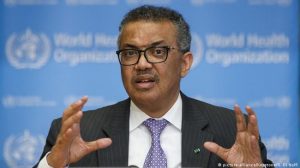Member States of the World Health Organisation (WHO) on Tuesday, May 24, 2022, re-elected Dr Tedros Adhanom Ghebreyesus to serve a second five-year term as Director-General of the world’s leading public health agency. He was first elected in 2017.

His re-election was confirmed during the 75th World Health Assembly in Geneva. He was the sole candidate.
This comes even as Member States agreed to adopt a landmark decision to improve the WHO’s financing model, which etails the recommendations of a Sustainable Financing Working Group made up of WHO’s Member States, which was set up in January 2021 and chaired by Björn Kümmel, from Germany.
In one of the key recommendations in the Working Group’s report to the Health Assembly, Member States target a gradual increase of their assessed contributions (membership dues) to represent 50% of WHO’s core budget by the 2030-2031 budget cycle, at the latest. In the last budget biennium, 2020-2021, assessed contributions represented only 16% of the approved programme budget.
The report includes other recommendations, such as exploring the feasibility of a replenishment mechanism to broaden the financing base. It also asks the WHO Secretariat to work with a Member States task group to strengthen WHO’s governance, which will make recommendations on transparency, efficiency, accountability and compliance. The task group’s work will help ensure that increases to Member States’ assessed contributions will be accompanied by further reforms to the way the organisation operates.
The vote that saw the re-election of Dr. Ghebreyesus was the culmination of an election process that began in April 2021 when Member States were invited to submit proposals for candidates for the post of Director-General. The WHO Executive Board, meeting in January 2022, nominated Dr Ghebreyesus to stand for a second term.
Dr Ghebreyesus’ new mandate officially commences on August 16, 2022. A Director-General can be re-appointed once, in accordance with World Health Assembly rules and procedures.
During his first term, he reportedly instituted a wide-ranging transformation of the WHO, aimed at increasing its efficiency driving impact at country level to promote healthier lives, protect more people in emergencies and increase equitable access to health.
He also guided WHO’s response to the COVID-19 pandemic, outbreaks of Ebola in the Democratic Republic of the Congo, and the health impacts of multiple other humanitarian crises.
WHO’s current financing model has been identified by many experts as posing a risk to the integrity and independence of its work. WHO’s over-reliance on voluntary contributions, with a large proportion earmarked for specific areas of work, results in an ongoing misalignment between organisational priorities and the ability to finance them. The recommendations arrived at are designed to substantially address these shortcomings.
It is intended that the gradual increase to assessed contributions will start with WHO’s 2024-25 budget, with a proposed 20% increase over the assessed contributions in the approved 2022-23 base budget. The aim is to reach 50% of WHO’s budget by 2028-2029 if possible, and by 2030-31 at the latest, up from the current 16% in 2020-21. This would mean that by 2028-2029, WHO would see an increase of roughly $600 million a year in the part of its income that comes from the most sustainable and predictable sources.
More predictable and sustainable funding for WHO makes economic sense for the organisation’s contributors, with its new investment case “A Healthy Return” showing that every US dollar invested in WHO delivers a return on investment of at least $35. Sustainable financing will better equip WHO to deliver more effectively for all its Member States and their populations, for example through longer-term programming in countries and attracting and retaining expertise.
WHO Director-General, Dr Tedros Adhanom Ghebreyesus, said: “This decision addresses head-on the decades-long challenge WHO has faced on predictable, flexible and sustainable funding. Delivering on the target they have agreed today will mean our Member States are empowering WHO to meet their expectations and truly fulfill our mandate as the world’s leading global health authority.” “Coming on the day I am re-elected, this decision gives all of us at WHO renewed confidence as we face the future,” he added.
Björn Kümmel, deputy head of the global health division at Germany’s Federal Ministry of Health and chair of WHO’s Working Group on Sustainable Funding, said: “This decision is about nothing less than the future role of WHO in global health. Even beyond that, it is about what we envisage for the global health architecture: a less fragmented, better coordinated, more efficient and truly inclusive global health governance with a fundamentally strengthened WHO at its centre as the enabled leading and coordinating authority.”
